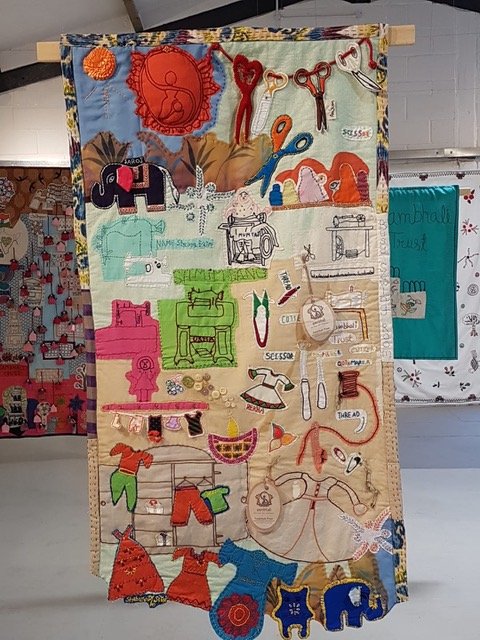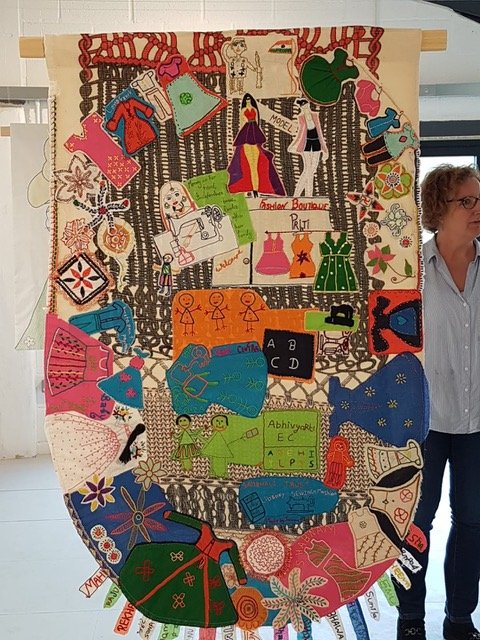Stitching Life Stories, Connecting Continents
by Carlea Bauman
Two of the panels created by the women and volunteers of Sambhali Trust
In a room at a Sambhali Trust Empowerment Center in 2019, British and Irish volunteers stood before sewing students and asked them to do something they weren’t used to doing: Use a needle and thread to express themselves.
Of course, the women and girls had been learning to sew for a while, but the instruction they received was for their stitches to be precise, with little to no room for experimentation. This was the first time many had been given a chance to free draw, to “color outside the lines,” so to speak, either through their sewing or elsewhere in their lives.
What resulted was an explosion of creativity—personal stories of the women of Sambhali Trust told in threaded pictures. Today, many of those images have found their way to the U.S. to be seen and experienced in person.
Photo by Colleen Prendiville
Colleen Prendiville of County Dublin, Ireland, was one of the volunteers who worked on the project and was in the room that day. She recalls with delight how the women, “just took to it. There was no hesitation. They just went for it.”
Colleen at home in Ireland
This was Colleen’s second visit to Sambhali Trust. The year before she visited briefly as part of a textile tour of India. The country, particularly Rajasthan, is known for a type of fabric design called block printing and is a popular destination for textile hobbyists. Though only at the Trust for a few hours, Colleen was taken by the mission and the women and girls she met and knew she would return.
Colleen learned embroidery in the early 2000s and since then has become highly involved in the textile movement in Ireland. She served as chairperson of Feltmakers Ireland for five years and today is a member of element15, a contemporary textile and mixed media art collective.
Chronicling life on cloth has taken place for thousands of years. “Ever since the first textile was created, there have been stories woven into fabric,” states the clothing website Matter. In The Iliad, Homer wrote of Helen of Troy embroidering a tapestry that depicted the war that was fought on her behalf. The Bayeaux Tapestry, made in the 11th century, tells the story of the Norman conquest of England in 1066.
Narrative textiles, as they are called, have also long played a significant role in raising awareness of social justice and equality issues: Think of the protest banners of the women’s suffrage movement in Britain in 1908 and the National AIDS Memorial Quilt created in 1985.
Cloth in and of itself is a symbol of independence within India. The khadi movement, begun by Mahatma Ghandhi in the early 1900s, was meant to break the country from its dependence on British textiles. As a result, weaving cotton into cloth became an act of patriotism performed by men and women among all castes.
Over the span of a week, Colleen and her fellow volunteers—there were six in all: Isobel Scott Clarke, Sarah Harrington (vice president and president of Sambhali U.K, respectively), Jennifer Morisetti and her daughter Charlotte, Colleen, and Helen Brown—visited six Sambhali empowerment centers. Within days, the pieces started coming in, eventually numbering in the hundreds.
They reflected a range of ideas and life experiences as diverse and individualistic as the women who created them. One piece made by a student named Huma showed a house, with a tree, swing, and a well, and included her sitting at a sewing machine that she knew she would receive at the end of her training. Some women embroidered aspirational scenes: Owning a fashion boutique, becoming a dress designer, serving as a soldier.
As the pieces came in, the volunteers began assembling them onto panels ranging from 1 ½ foot square to 2 x 4 feet. Some panels were created by theme: home, environment, sisterhood, and the faces of Sambhali, for example. To date, 18 panels have been completed, including several put together by Sambhali staff and several done the following year when Jenny Morisetti returned to Jodhpur.
The panels were shown at a number of venues in the UK prior to the onset of the pandemic. In 2023, a group of the panels made their way to the United States to be displayed at Sambhali U.S. SUStenance events.
SUStenance (Sambhali U.S.) events are in-person, virtual, or hybrid events that anyone can host with support, advice, and tools provided by Sambhali U.S. The goal is to introduce friends, family, and colleagues to the amazing Sambhali Trust programs in India and how Sambhali U.S. is supporting those efforts. So far this year, SUStenance events held in Maryland, Virginia, New York, and West Virginia featured the panels, as will upcoming ones in Massachusetts and California, allowing attendees to view them up close and learn more about the women who created them.
Charlotte Morisetti and Colleen Prendiville at Sambhali Trust in 2019
Colleen visited the United States this summer and was at the Virginia event where she explained the process of creating the panels. Host Lynn Broadbent explained the impact:
Having visited Sambhali Trust in Jodhpur I already knew how important its work is, and I wanted to give members of my giving circle an opportunity to learn about it. We were able to display the story panels embroidered by Sambhali participants, and Colleen described how they came about. Hearing the stories told by the panels, and ‘meeting’ some of the women on the videos gave a strong sense of connection. Overall, this made for a very meaningful event for my group and taking home a little bag made by Sambhali artisans was a sweet touch that everyone enjoyed. Clearly there is something about Sambhali that resonates with many of the women I know.
The panels make an emotional impact on those who see them, which doesn’t surprise Colleen. “It’s a very powerful medium. Fabric, or cloth, as I prefer to call it, is central. The textures and the whole sense of it being connected to us as humans, cloth is nearly the first thing we touch when we’re born.”
Most of the panels will travel to Austria for events this fall, but a few will remain in the care of Sambhali U.S. for the time being, ready to tell the stories of the women and girls of Sambhali.
If you are interested in holding a SUStenance event, contact us.







